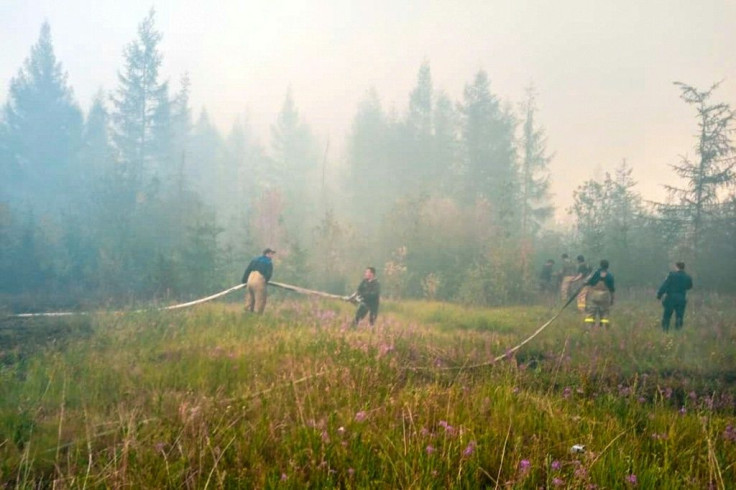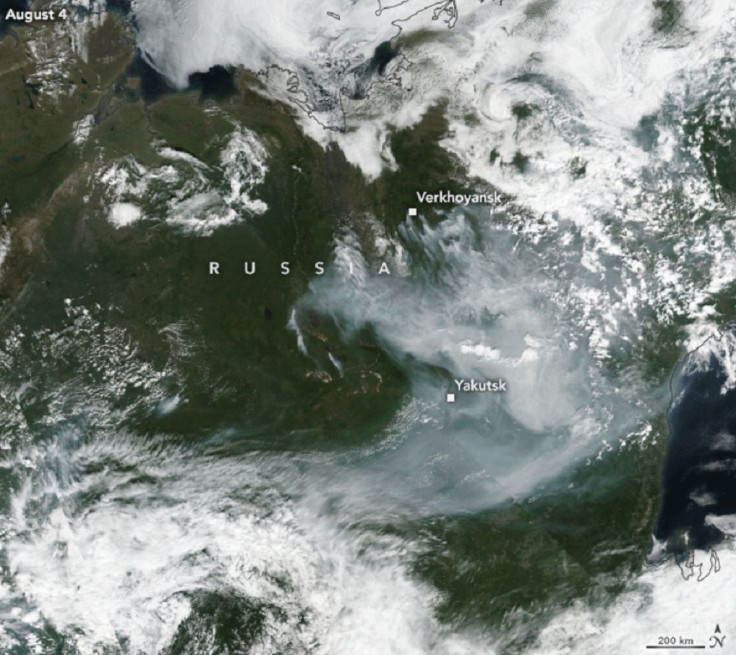Frozen Siberia Is Burning And Creating A Haze In Alaskan Skies

KEY POINTS
- Haze and smoke from Siberia’s burning forests have hovered across Anchorage over the past days
- Siberia is only roughly two weeks into its annual fire season
- The Putin administration has deployed military aircraft to aid in the wildfire crisis following criticism
Wildfires in Siberia have started creating a haze in Anchorage, Alaska, but are expected to gradually disperse by mid-week, according to a National Weather Service meteorologist.
Adam Przepiora said that while the upper winds are carrying Siberian smoke into Southcentral Alaska, the smoke is expected to clear by the middle of the week, the Anchorage Daily News reported.
Over the weekend, temperatures across Anchorage climbed to the 70s. Anchorage has been experiencing warmer weather over the past few days, but forecasts have suggested a chance of rain by Tuesday.
Wildfire smoke from Siberia is filtering into Southcentral Alaska and creating a haze across Anchorage skies https://t.co/KZR4MFASva
— Anchorage Daily News (@adndotcom) July 18, 2021
This is not the first time Siberian wildfire smoke has moved across Alaskan skies.
In July last year, haze reached as far as Tok and Northway after observers first reported haze forming in the skies of Anchorage and Palmer.
At that time, the Alaska Public Media cited the Department of Environmental Conservation’s air monitoring stations as saying that air quality was slowly decreasing.
News of the haze in Alaska came around two weeks after the Siberian town of Verkhoyansk made history by reporting a temperature of 100.4 degrees Fahrenheit.
Poor air quality due to #wildfires in #Yacutia, #Siberia has spread from #Russia across the international dateline to Alaska, as detected by #Copernicus #Sentinel5p satellite monitoring of carbon monoxide column on July 13 and 14
— World Meteorological Organization (@WMO) July 15, 2021
via @PlatformAdam pic.twitter.com/mDHfBYWsJ8
Siberia has been suffering from a third consecutive year of the worst wildfires the Russian region has experienced. In the capital city of Yakutsk, thick smoke has been seen as Russia barely ended the second week of its fire season.
The New York Times reported that in Yakutia, where approximately 144 fires have been burning this year, residents expressed anger over the ongoing wildfire crisis in the region.
Some residents blamed the wildfires on authorities who have allegedly not done enough to contain the blazes.
Photos from the burning sites show volunteers working to contain fires. Some volunteers can be seen with dirty faces as they walk through a thick haze.
Russia has been criticized for helping other countries fight wildfires while local firefighters request aid and resources.
”2,000 firefighters on the ground who are battling wildfires raging across almost 800,000 hectares (roughly 2 million acres) in Siberia.”https://t.co/OOVqBwUB7y
— Greta Thunberg (@GretaThunberg) July 15, 2021
The Russian government under President Vladimir Putin has denied human responsibility in global warming over the years. However, it appears that the government has had a change of heart as military aircraft were deployed last week to help battle the fires, Deutsche Welle reported.
The Russian Defense Ministry said Ilyushin II-75 transport planes were deployed for water-bombing activities across the Sakha-Yakutia region.
As of last week, there have been some 300 fires burning in Siberia. Nearly 800,000 acres are burning despite the work of around 2,000 firefighters and volunteers on the ground.

© Copyright IBTimes 2025. All rights reserved.






















